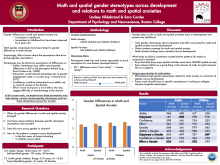Attitudes and beliefs about math and space have been found to be predictive of STEM participation and achievement, with females generally reporting lower math and spatial self-concept and higher anxieties related to these domains (e.g., Sokolowski et al., 2019). However, little work to date has explored the acquisition of these attitudes and beliefs, particularly related to the domain of space. This is important, because comparing the acquisition of math and spatial attitudes and beliefs may shed light on potential interventions for improving STEM outcomes. Here, we examine math and spatial gender stereotypes and their relation to math and spatial anxiety - a potential consequence of these stereotypes.
The Developmental Emergence and Consequences of Spatial and Math Gender Stereotypes
Download Original:
Principal Investigator:
Discipline/Topic:
Target Audience:
